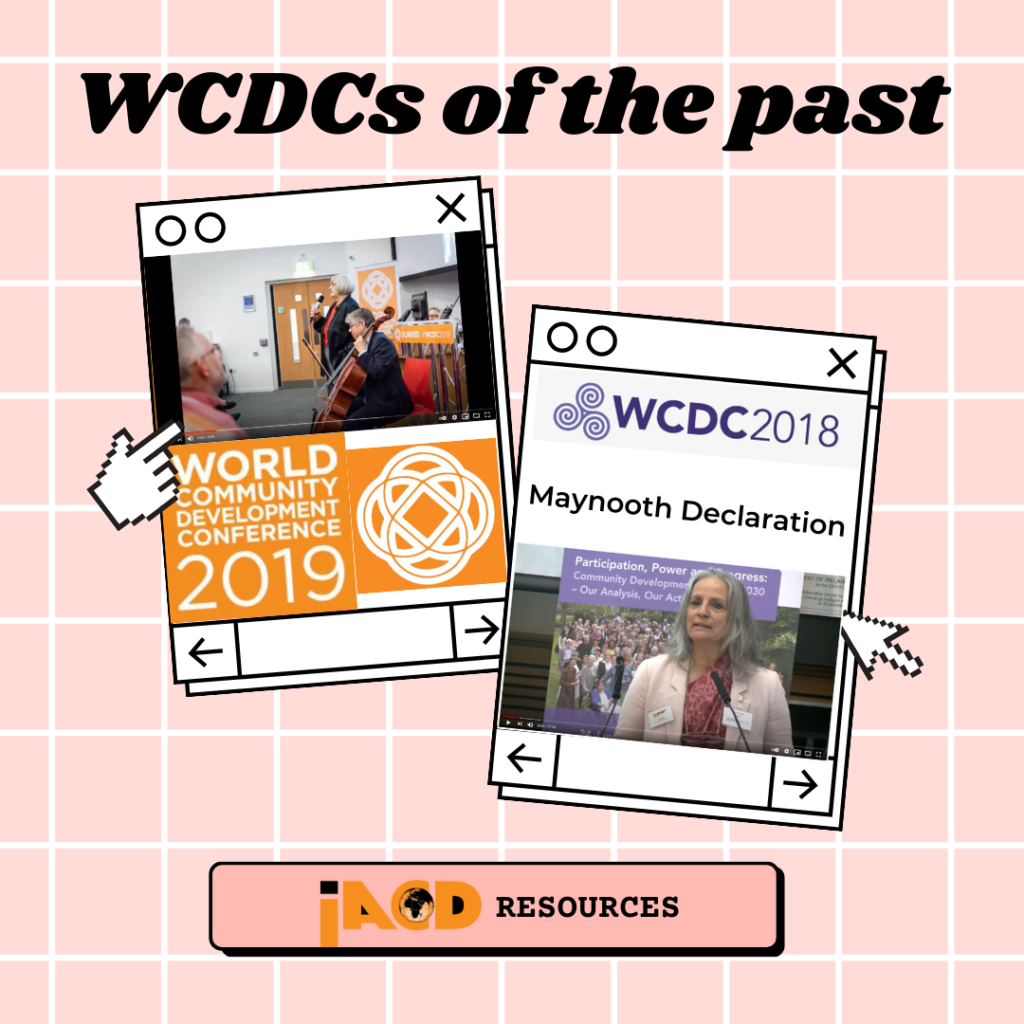
HISTORY
In 2018, at the initiative of Community Work Ireland, the national network for Ireland, we have called our international annual conference the World Community Development Conference. The 2018 and 2019 WCDC’s each attracted between 300-500 participants and included high profile keynote speakers, panel debates and dozens of workshops, plus field visits to community development projects in proximity.
PAST WORLD COMMUNITY DEVELOPMENT CONFERENCES
June 2019

World Community Development Conference 2019 in Dundee, Scotland
Theme: People, Place, and Power
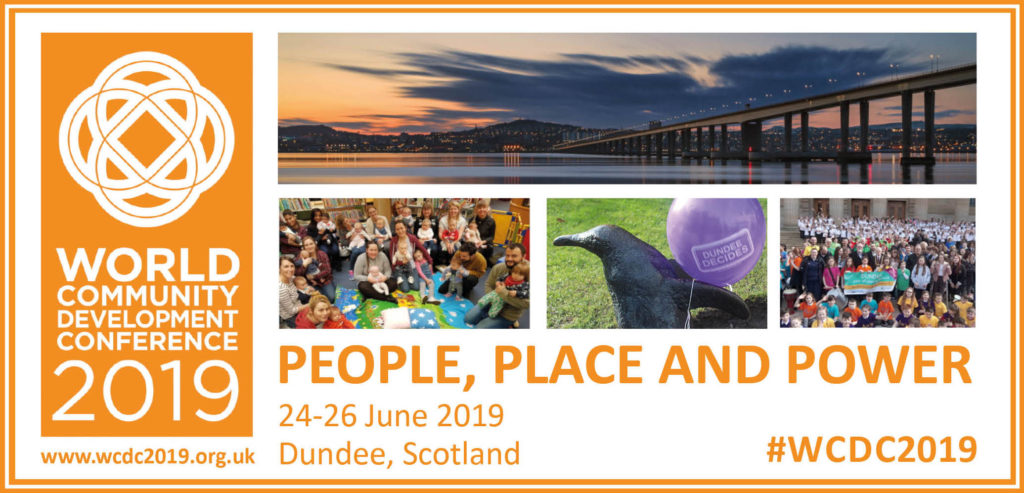
Conference Vision
The nature of the relationship between people, place and power is changing and community work practices across the globe need to be able to influence these new global dynamics. Global challenges of climate change, forced and economic migration, increasing levels of mental ill health, isolation and loneliness alongside the rise of right-wing populism and threat to human rights mean that we need to find new ways of disrupting, challenging and revealing structures of power.
The city of Dundee has a rich history of social change, community activism and community arts and it is through celebrating the achievements of the city’s past that we will build spaces for engaged, practice-led dialogue that poses questions about the identity, purpose and practices of community development.
Reasons Delegates Attended
The conference provided a unique opportunity for practitioners, participants, academics, policy makers, funders and other stakeholders to share perspectives on current contexts and challenges for community work. The conference encompassed cutting edge inputs, papers, creative installations and poster presentations on rights-based community development, addressed and engaged locally, nationally and internationally.
Practice Exchanges
Following the main conference, delegates had the opportunity to take part in a one or three-day themed learning journey to see community development in action in the east coast of Scotland. This enabled a deeper understanding of the context and practice of community development in rural and urban settings in Dundee and neighbouring areas.
Conference Videos
Book of Abstracts
Conference Program
WCDC2019 Practice Insights
After the conference, we produced an issue of our Practice Insights magazine. This took aspects we explored during the conference and went into greater detail on several projects.
Conference Organisers
The conference organisers are the International Association for Community Development (IACD), the Scottish Government, the Community Learning and Development team at the University of Dundee, Dundee City Council, and Leisure and Culture Dundee, supported by Dundee and Angus Convention Bureau.
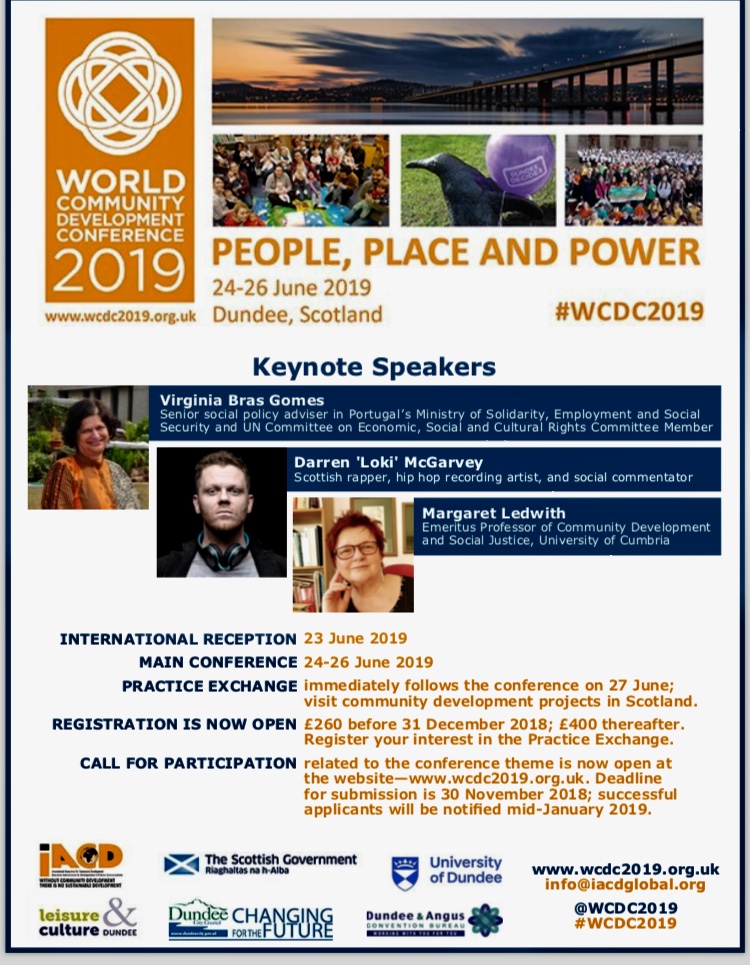
June 2018
World Community Development Conference in Maynooth, Ireland
Theme: Participation, Power and Progress: Community development towards 2030 – Our analysis, Our actions.
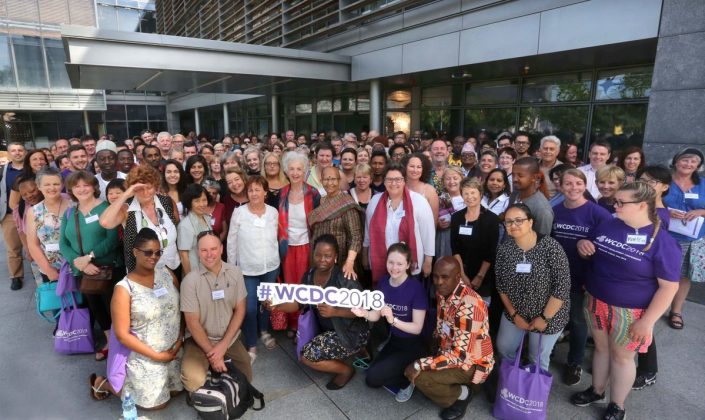
The 2018 World Community Development Conference provided a unique opportunity for practitioners, participants, academics, policy makers, funders and other stakeholders to share perspectives on current contexts and challenges for community work. The conference encompassed cutting edge inputs, papers, creative installations and poster presentations on rights-based community development, addressing and engaging locally, nationally and internationally with key current issues including:
- Change and transformation
- Impact and outcomes: Measuring and monitoring
- The role of state agencies, regional and local authorities
- Current rural and/or urban challenges
- International development
- Community economic development
- Environmental/climate justice and sustainable development
- Women’s rights
- Gender
- Poverty
- Migration
- Racism
- Indigenous peoples and minority rights
- Disability
- Health
- Community development standards, education and training
- Community development and other disciplines
- Civil and political rights
- Economic, social, and cultural rights
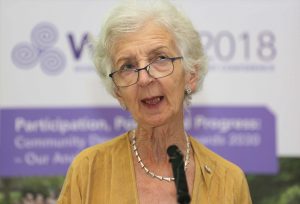
Purpose: To provide a practical insight into the work of community workers and community development organisations in Ireland working on a range of national and local issues. The organisations visited will include those listed below.
Learning Objectives
- To gain an overall understanding of:
- issues facing communities in both Irish urban and rural contexts
- Irish community work, principles that inform it, methods used and outcomes achieved
- To compare and contrast issues, approaches, methods and outcomes in Ireland and elsewhere
- To consider how the approaches seen could be used in one’s own practice, research and teaching
Keynote Speakers
WCDC 2018 was thrilled to host a range of high level speakers from the community development sector, including Mary Robinson, Dr Peter Westoby, Anita Paul, Bernadette McAliskey, Jim Ife, Lynne Segal, Jose Francisco Cali Tzay, and Dr Yaser Alashqar.
All of the keynote speeches are available to watch here: https://www.communityworkireland.ie/wcdc2018-video-gallery/
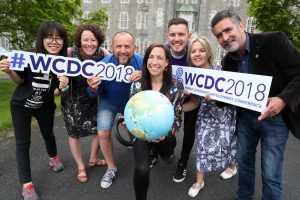
Book of Abstracts
Practice Exchanges
The conference was followed by two Practice Exchanges; one in Dublin and the other on the west coast of Ireland themed The Wild Atlantic Way. This Practice Exchange involved engaging with a number of projects and initiatives along Ireland’s beautiful west coast and off-shore islands, including rural, urban, family, Traveller, partnership and youth initiatives.

Conference organisers
The main partners were IACD, Community Work Ireland and the University of Maynooth. The conference received considerable support from the Irish and Scottish governments and Irish local authorities.
You can find out more about WCDC 2018 at the conference including pictures from it here http://www.wcdc2018.ie/

Full Programme
The full programme can be found here.
WCDC2018 Practice Insights
Maynooth Declaration
Community Development for Rights, Recognition and Re-distribution
Recognising the many challenges, including poverty, racism and inequality, which are enduring features of all societies and present the context for community development throughout the world;
Acknowledging that the way we use and treat our world is unsustainable and that there is an urgent need for climate and environmental justice actions globally;
Emphasising the intersectional nature of poverty and oppression, which exacerbates injustice and rights abuses and systematically ignores and undermines the diversity of cultures, communities and peoples throughout our world;
Resisting neo-liberalism as a key contributor to the persistence and growth of poverty globally and the creation of economic systems that sustain and deepen inequalities, eroding the capacity of national governments to uphold their responsibilities as human rights duty bearers;
Remembering the role community development workers have played in mobilising communities and creating the conditions for civil society to address needs, concerns and interests;
Reasserting our commitment to the Universal Declaration of Human Rights in this its 70th anniversary, the international human rights architecture enshrined in human rights treaties and covenants of the United Nations, as well as the UN Sustainable Development Goals essential for our future and regional multilateral organisations across the globe;
We, the delegates at the World Community Development Conference held in Maynooth University, Ireland in June 2018, make the following declaration collectively:
We reaffirm community development as a process where people concerned with human rights, economic, social and environmental justice act collectively to change societal circumstances. With good processes determining good outcomes, community development will continue to address power imbalances and strengthen the capacities of rights holders to define, claim and realise their rights by holding stakeholders to account. Supporting and valuing the diversity of communities, community workers will continue to address the causes and consequences of marginalisation and oppression on the basis of key factors including but not exclusive to, gender, ‘race’ and class.
We value the on-going contribution of community development to addressing local to global concerns. We recognise its contribution to the deepening and invigorating of democracy, in the creation of better policy, in enhancing equality and in realising rights, in contributing to social cohesion, and in strengthening the collective voice of communities experiencing poverty, prejudice, social exclusion and inequality in the decision making processes that affect their lives.
We reconfirm community development as a proven means of building a just, sustainable and peaceful world and call on local, national, regional and global authorities and governments to recognise, support and sufficiently resource independent community work through appropriate political leadership, funding, policy and legislation.
